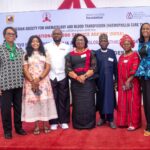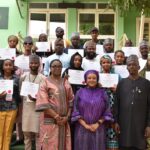By Ijeome Olorunfemi/Vivian Emoni
Stakeholders from various sectors have called for an urgent and effective collaboration to propel investment in satellite infrastructure and also prioritise integration of space technologies into development blueprints.
The stakeholders made the call in Abuja in a communiqué issued by Mrs Olayemi John-Mensah, Abuja Chamber of Commerce and Investment’s (ACCI) Media and Strategic Officer, after a three-day 2025 Africa Space Economy Conference and Exhibition (ASEC).
The conference was organised by the ACCI and National Space Research and Development Agency (NASDRA), with the theme “Space Economy and Emerging Markets in Africa.”
The conference had government officials, private sector players, research institutions, development partners, diplomatic communities, and international organisations in participation.
The participants, however, expressed optimism about Africa’s growing involvement in space ecosystem, while also identifying key structural challenges.
According to the communiqué, the challenges include limited access to satellite infrastructure, inadequate funding for innovation, and the need for skilled labour in satellite engineering, data processing and policy development.
“Stakeholders should prioritise the integration of space technologies into development blueprints, particularly in agriculture, health, urban planning and telecom,” it said.
The stakeholders at the conference recommended that governments, through agencies such as NASRDA, should expand access to satellite infrastructure via different models to stimulate private-sector participation.
They recommended that the African Union (AU) and Member States must use their regulatory frameworks and jointly promote research, education and technology transfer within the continent.
“Capacity-building programmes should be tailored to include youth and women, especially through partnerships with universities and technical institutes.
“Stakeholders must explore sustainable financing models such as blended finance, government grants, venture capital and donor support for space innovation,” it said.
The communiqué also recommended that a national monitoring strategy using space technologies to monitor, enforce compliance, and derive maximum value from natural resources should be developed.
The stakeholders also encouraged NASRDA and ACCI to establish an Emerging Technology Innovation Park focusing on Information Communication Technology (ICT), robotics, and geospatial applications to support entrepreneurship in the sector.
It added that government institutions should be mandated to adopt satellite data systems for planning, monitoring and reporting, which would be driven through by space capabilities.
“Also, there is a need to increase awareness among the public and industrial sectors, on the value of space data.
“This can be achieved through targeted outreach and national campaigns.”
The stakeholders as well recommended that Nigeria should deepen its data partnerships with regional and global institutions to enhance access to cutting-edge space assets and promote knowledge exchange.
It also said that relevant ministries and national planning offices should have designated officers to coordinate space programmes, to align implementation with national strategies.
In the areas of military and security, they recommended that training and adoption of space technologies should be deployed to enhance national safety and surveillance operations, among other recommendations. (NAN)(www.nannews.ng)
Edited by Emmanuel Afonne












